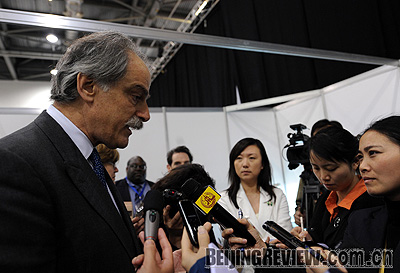| Some economists say the agreements reached at the G20 London summit in early April will benefit China's economy to some extent.
 |
|
FOCUS ON IMF REFORM: Chinese reporters interview the First Vice President of the IMF, John Lipsky (left), during the G20 London summit on April 2 (ZENG YI) | "Anti-protectionism and the $250 billion to support trade finance will be of special significance to China's export and will encourage the Chinese economy to recover as soon as possible," said Zhang Yansheng, an economist at the Academy of Macroeconomic Research under the National Development and Reform Commission.
Zhang pointed out that Chinese enterprises currently face many challenges, such as fewer orders and a lack of financing to sustain their operations. Anti-protectionism promise and the $250 billion for financing could revive international trade, which has stalled because export enterprises no longer have access to capital. These measures would greatly benefit China's foreign trade, especially its export sector, Zhang said.
As the third largest trading nation in the world, China's foreign trade dependence ratio has exceeded 60 percent. Declining global trade has had a negative impact on the Chinese economy, Zhang said.
"I hope the common understandings reached during the summit can be put into practice soon," Zhang said.
Stephen Green, a senior economist at Standard Chartered China, pointed out that the fund injection for the International Monetary Fund (IMF) would also benefit China's export sector. Wang said the bigger IMF fund would help more emerging economies in trouble, such as Mexico, South Korea and those of the Eastern European countries. Because these countries are important importers of Chinese products, the fund injection is expected to revitalize Chinese export-oriented enterprises.
The G20 summit was also a great opportunity for China, as the country will have a seat on the Financial Stability Board (FSB) to be established, said Yi Xianrong, a researcher at the Institute of Finance and Banking under the Chinese Academy of Social Sciences.
China fully participated in the summit as a negotiator and rule-maker instead of a bystander-a role it used to play in past international economic meetings. The changed role not only enables China to better secure and protect its own interests in the international arena, but also helps create a new international economic order that is fair and just to protect interests of developing countries, Yi said.
To participate in future international affairs, the Chinese Government needs to enhance its comprehensive national power by speeding up the pace of reform and opening up, and the promoting economic and social development. Yi said.
According to Xinhua News Agency, the agreements reached at the G20 summit will provide a bigger space for the development of China's finance reform endeavors. One report quoted Zhuang Jian, a senior economist with the Asian Development Bank's China Resident Mission, who said that if the G20's common understanding about reforming the international financial regulatory system could be implemented step by step, China would gain a bigger voice in affairs that affect the international financial system, because the reform would deeply influence the global financial order.
Leaders at the summit agreed on strengthening their cooperation in supervising the international financial system by extending the range of supervision to financial institutions, tools and markets that are of systematic importance. They also decided to include hedge funds for the first time and credit-rating institutions. The salaries of senior executives at financial institutions also will be monitored.
Besides establishing a new FSB that includes all G20 members to replace the current Financial Stability Forum, the London summit decided to carry out many reforms to modernize international financial institutions. The new financial system is expected to be more capable of dealing with the changing world economy and the challenges of globalization. Moreover, emerging markets and developing countries, including poorer countries, must have greater representative rights.
The Xinhua report pointed out that experts considered these agreements as the key action that will allow China a greater say in determining the international financial order. The United States, with 17 percent of voting rights in the IMF, has the right to veto the IMF's decisions on important issues. Currently, China only holds 3.66 percent, which does not match its proportion of the world economy.
"If the common understandings reached during the summit can be put into practice, there will be no doubt that they will help to stabilize global finance and encourage the development of China's financial sector and even the Chinese economy," Zhuang said.
| 